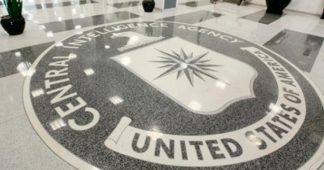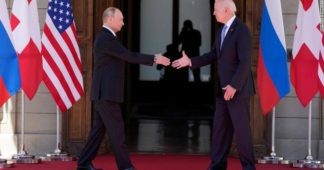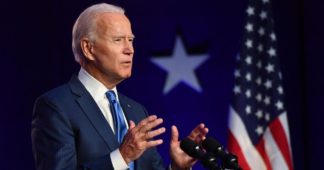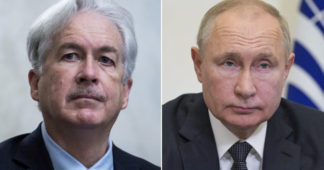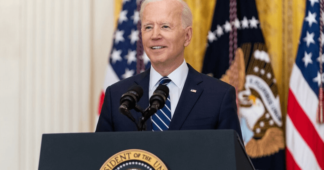By Peter Beinart
Feb 7, 2022
If you’ve followed the diplomacy over Ukraine closely, you may have noticed that the Biden administration has relied heavily on CIA Director William J. (Bill) Burns. In November it dispatched him to Moscow where, according to CNN, he served as a “key intermediary” between the US and Vladimir Putin. In January he flew to Germany to discuss Ukraine with the new government in Berlin. This all makes sense. Burns is the Biden administration’s highest-ranking Russia expert. He’s a fluent Russian speaker who has served twice in the US embassy in Moscow, the second time as ambassador. Which makes it all the more striking that Burns, in his memoir, flatly contradicts the Biden administration’s narrative about how this crisis came to be. Remarkably, one of the most trenchant critics of official US discourse on Russia and Ukraine is the sitting director of the CIA.
To hear the Biden administration tell it, the Ukraine crisis is the product of one man: Vladimir Putin. Putin fears that if Ukraine joins NATO and becomes a pro-Western democracy, Russians will want the same for themselves and thus rise up against his tyrannical rule. The idea that Russians genuinely think NATO poses a security threat is transparent bunk.
The Biden narrative isn’t entirely false. Putin surely does fear that a democratic, pro-Western Ukraine could inspire popular uprisings in his country. But it is partially false because it suggests that were Putin not in power, Russia’s government would have no problem with Ukraine joining NATO. And it implies that the US bears no responsibility for the current standoff. According to Bill Burns, Biden’s own CIA Director, neither of those claims are true.
Two years ago, Burns wrote a memoir entitled, The Back Channel. It directly contradicts the argument being proffered by the administration he now serves. In his book, Burns says over and over that Russians of all ideological stripes—not just Putin—loathed and feared NATO expansion. He quotes a memo he wrote while serving as counselor for political affairs at the US embassy in Moscow in 1995. ‘Hostility to early NATO expansion,” it declares, “is almost universally felt across the domestic political spectrum here.” On the question of extending NATO membership to Ukraine, Burns’ warnings about the breadth of Russian opposition are even more emphatic. “Ukrainian entry into NATO is the brightest of all redlines for the Russian elite (not just Putin),” he wrote in a 2008 memo to then-Secretary of State Condoleezza Rice. “In more than two and a half years of conversations with key Russian players, from knuckle-draggers in the dark recesses of the Kremlin to Putin’s sharpest liberal critics, I have yet to find anyone who views Ukraine in NATO as anything other than a direct challenge to Russian interests.”
While the Biden administration claims that Putin bears all the blame for the current Ukraine crisis, Burns makes clear that the US helped lay its foundations. By taking advantage of Russian weakness, he argues, Washington fueled the nationalist resentment that Putin exploits today. Burns calls the Clinton administration’s decision to expand NATO to include Poland, Hungary, and the Czech Republic “premature at best, and needlessly provocative at worst.” And he describes the appetite for revenge it fostered among many in Moscow during Boris Yeltsin’s final years as Russia’s president. “As Russians stewed in their grievance and sense of disadvantage,” Burns writes, “a gathering storm of ‘stab in the back’ theories slowly swirled, leaving a mark on Russia’s relations with the West that would linger for decades.”
As the Bush administration moved toward opening NATO’s doors to Ukraine, Burns’ warnings about a Russian backlash grew even starker. He told Rice it was “hard to overstate the strategic consequences” of offering NATO membership to Ukraine and predicted that “it will create fertile soil for Russian meddling in Crimea and eastern Ukraine.” Although Burns couldn’t have predicted the specific kind of meddling Putin would employ—either in 2014 when he seized Crimea and fomented a rebellion in Ukraine’s east or today—he warned that the US was helping set in motion the kind of crisis that America faces today. Promise Ukraine membership in NATO, he wrote, and “There could be no doubt that Putin would fight back hard.”
Were a reporter to read Burns’ quotes to White House press secretary Jen Psaki today, she’d likely accuse them of “parroting Russian talking points.” But Burns is hardly alone. From inside the US government, many officials warned that US policy toward Russia might bring disaster. William Perry, Bill Clinton’s Defense Secretary from 1994 to 1997, almost resigned because of his opposition to NATO expansion. He has since declared that because of its policies in the 1990s, “the United States deserves much of the blame” for the deterioration in relations with Moscow. Steven Pifer, who from 1998 to 2000 served as US ambassador to Ukraine, has called Bush’s 2008 decision to declare that Ukraine would eventually join NATO “a real mistake.” Fiona Hill, who gained fame during the Trump impeachment saga, says that as national intelligence officers for Russia and Eurasia she and her colleagues “warned” Bush that “Putin would view steps to bring Ukraine and Georgia closer to NATO as a provocative move that would likely provoke pre-emptive Russian military action.”
Burns’ criticisms of past US policy toward Russia and Ukraine don’t mean he opposes Biden’s policy today. He may believe that while pushing NATO expansion helped bring about the current standoff, it would be a mistake to pull back from it now—at the point of a Russian gun. Until his next memoir, we’ll likely never know. But Burns’ criticisms are crucial nonetheless because they expose a fallacy in the current debate. Hawks say that if you criticize US policy toward Russia you’re whitewashing Putin’s aggression. What Burns shows is that it’s possible to recognize Putin’s malevolence while also recognizing that the US, by repeatedly humiliating Russia when it was weak, made it more likely that a figure like him would arise and seek to settle old scores. The US has a habit of this: By abandoning the Iran deal, for instance, and discrediting the Iranian moderates who negotiated it, the US helped ensure the election of Ebrahim Raisi, a brutal hardliner. Obviously, America’s power over what happens in other nations is limited. But the message of Biden’s CIA Director is that we haven’t wielded it as wisely as we could.
Published at peterbeinart.substack.com
We remind our readers that publication of articles on our site does not mean that we agree with what is written. Our policy is to publish anything which we consider of interest, so as to assist our readers in forming their opinions. Sometimes we even publish articles with which we totally disagree, since we believe it is important for our readers to be informed on as wide a spectrum of views as possible.
